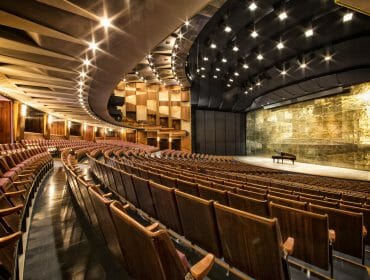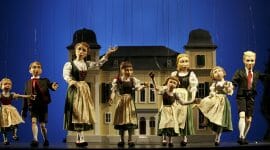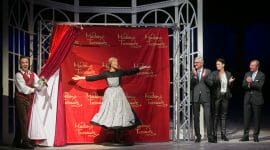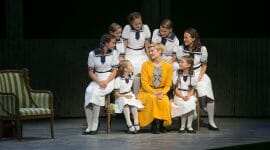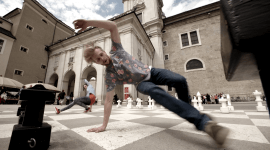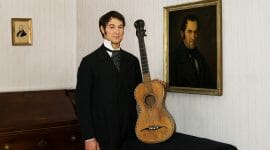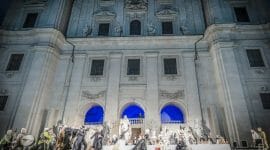In the Holy Week Salzburg is transformed into the classical music meeting place for music lovers. The Salzburg Easter Festival, one of the most attractive and best classical music festivals in the world, takesplace from 27. March to 6. April 2026. Here you will find all details about the Easter Festival.
Artistic Director Nikolaus Bachler presented a particularly diverse programme for the Salzburg Easter Festival 2026. The Salzburg Easter Festival will open a new chapter from 2026: with the Berliner Philharmoniker, the founding orchestra will return to the Salzach. For the first five years of the residency, Artistic Director Nikolaus Bachler and Kirill Petrenko, Chief Conductor of the top Berlin orchestra since 2019, will present new productions of two works: Richard Wagner’s tetralogy »Der Ring des Nibelungen« and Arnold Schoenberg’s only grand opera »Moses und Aron«. The new »Ring« will be staged by Russian director Kirill Serebrennikov, with Christian Gerhaher making his role debut as Wotan. Kirill Petrenko will also conduct Gustav Mahler’s monumental 8th Symphony, while the other concerts will feature violinis
Here you will find all details on the current programme of the Easter Festival: www.osterfestspiele-salzburg.at
Richard Wagner: Der Rind der Nibelungen – Das Rheingold
In 2026, the Salzburg Easter Festival will open its new Ring cycle with Das Rheingold, following the chronological order of Wagner’s tetralogy. Kirill Petrenko, who has conducted the Ring in Meiningen, Bayreuth, and Munich, will lead the musical direction, while acclaimed director Kirill Serebrennikov will stage the production, aiming to transform the saga into a global mythic experience inspired by diverse folk art and contemporary themes.German baritone Christian Gerhaher makes his role debut as Wotan, joined by an international cast representing the next generation of Wagner voices, including Brenton Ryan, Leigh Melrose, Catriona Morison, Sarah Brady, and Jasmin White. Unlike previous editions, the 2028 cycle will include Arnold Schoenberg’s Moses und Aron, combining tradition with a forward-looking perspective. The ambitious production will unfold over five Easter festivals, blending Wagner’s legendary Ring with groundbreaking, timeless works that explore social and spiritual themes.
Choral concert I: Haydn
Conductor Daniel Harding leads the Bavarian Radio Chorus and the Berlin Philharmonic, with soloists soprano Hanna-Elisabeth Müller, tenor Andrew Staples, and bass Konstantin Krimmel. The program features Joseph Haydn’s oratorio Die Schöpfung, a monumental work depicting the creation of the world from chaos. Daniel Harding, Chief Conductor of the Orchestra dell’Accademia Nazionale di Santa Cecilia, has maintained a nearly 30-year artistic relationship with the Berlin Philharmonic, beginning with his debut at age 21.
Choral concert II: Mahler
Conductor Kirill Petrenko leads the Berlin Philharmonic, joined by eight soloists—sopranos Jacquelyn Wagner, Golda Schultz, Liv Redpath; altos Beth Taylor, Fleur Barron; tenor Benjamin Bruns; baritone Gihoon Kim; and bass Le Bu—alongside the Rundfunkchor Berlin, Bachchor Salzburg, and the Salzburg Festival Theatre and Children’s Choir. The second Choral Concert features Gustav Mahler’s monumental Eighth Symphony, the “Symphony of a Thousand,” performed by Petrenko with the Berlin Philharmonic for the first time. With its massive orchestra, three choirs, and eight soloists, Mahler’s work surpasses all previous choral symphonies. After a 15-year hiatus, the Berlin Philharmonic brings this extraordinary piece back to the stage—first in Berlin’s Philharmonie and then at the Salzburg Easter Festival under Petrenko’s direction.
Orchestral concert: Brahms-Bruch/Berlioz
Conductor Tugan Sokhiev leads the Berlin Philharmonic in two exceptional concerts, with Noah Bendix-Balgley (violin) and Bruno Delepelaire (cello) performing Brahms’ Double Concerto, and Janine Jansen (violin) performing Bruch’s Violin Concerto. The centerpiece of both concerts is Hector Berlioz’s dramatic Symphonie fantastique. Sokhiev, a regular collaborator with the Berlin Philharmonic since 2010, brings his dynamic artistry to these performances, while Jansen, renowned for her nuanced interpretations and Herbert von Karajan Award recognition at the Salzburg Easter Festival, delivers a standout performance of Bruch.
Chamber Concerts/Late night concerts
A beloved tradition returns to the Easter Festival: an engaging chamber music program featuring members of the Berlin Philharmonic. The concerts explore contrasts and rivalries in music, from Mozart versus Salieri, Brahms versus Bruckner, to Shostakovich versus Schoenberg. In addition to the regular Chamber Concerts, the ensembles present two late-night performances. Concerts are held in the Great Hall and Solitär of the Mozarteum, as well as at Szene Salzburg, allowing the orchestra to extend its presence beyond the festival district into other parts of the city.
Special concert Berliner Philharmoniker
Conductor Tugan Sokhiev and members of the Berlin Philharmonic invite amateur musicians from Austria and neighboring countries to join a unique educational project: the Be Phil Orchestra Salzburg Easter Festival 2026. Under the motto “Be yourself – Be music – Be Phil”, around 100 amateur musicians from Austria, Italy, the Czech Republic, Slovenia, Hungary, Liechtenstein, Germany, Switzerland, and Slovakia will take part. Rehearsals begin in Salzburg on 29 March under Sokhiev’s direction, with the final concert held on 2 April 2026 in the Großes Festspielhaus. The program features Antonín Dvořák’s Eighth Symphony and Mozart’s Sinfonia Concertante for four wind instruments and orchestra, with Berlin Philharmonic members performing the solo parts. The Easter Festival intended continuing the newly founded dance and electro programme in 2025, and was inviting internationally known artists to engage with the topic Wounds and Wonders.
Dance: Plantet (Wanderer) – Austrian premiere
Internationally acclaimed choreographer Damien Jalet brings one of his works to Salzburg for the first time, in collaboration with Japanese visual artist Kohei Nawa. Planet [wanderer] explores the fragile relationship between humans and the Earth, creating a monumental installation of bodies. Inspired by the Greek etymology of planet (planaomai, “to wander”), the work forms a universe where imagination has no limits, blurring the boundaries between dance and visual art to create moving sculptures or sculptural dance. Jalet, the German-Belgian choreographer and dancer, is renowned for monumental works such as Chiroptera (2023), performed on the façade of Paris’ Opéra Garnier with 153 dancers. He has also choreographed for Madonna (tours Madame X and Celebration) and films including Suspiria (Luca Guadagnino), Anima (Paul Thomas Anderson), and Emilia Pérez (Jacques Audiard).
Herbert von Karajan – Salzburg’s great conductor
The Salzburg Easter Festival was above all the product of a single Salzburger: Herbert von Karajan. After studying at the Mozarteum and in Vienna, he conducted the Mozarteum Orchestra for the first time at the age of 20. From this first appearance, it was clear that his path would lead to the very top. From 1960 onwards, Karajan was an integral part of the Salzburg Festival. When, seven years later, with the founding of the Easter Festival, whose leading thereof took over his life, he created a monument not only to himself but also to the music scene in Salzburg.
Exceptional quality
Karajan’s explicit wish and expectations was to only have the best on stage. It had been a conscious decision to keep the Easter festival smaller than the Salzburg Festival as this was the only way they could guarantee unique performances from world-class musicians. Karajan was renowned and respected for his perfectionism. He took the opportunity to use “his” Berlin Philharmonic Orchestra and his many contacts around the world to get only the best musicians and singers.
Here you will find all details on the current programme of the Easter Festival: www.osterfestspiele-salzburg.at
The artistic directors of the Easter Festival – Austrian premier
The high quality of the Easter Festival continued even after Karajan was no longer there. One of the main reasons were the chief conductors of the Berlin Philharmonic Orchestra, who were also automatically responsible for the artistic direction:
-
-
- Herbert von Karajan: 1967 (founding) until 1989 (Karajan’s death)
- Sir Georg Solti: Solti assumed the artistic direction in 1989 after Karajan died, shortly before the festival, and then worked at the Salzburg Festival. In 1992/93 he took over the artistic direction of the Easter Festival.
- Claudio Abbado: Abbado became the artistic director in 1994 and expanded his first Festival with the series “counterpoints” (“Kontrapunkte”): chamber orchestras with members of the Berlin Philharmonic Orchestra collaborating with first-class soloists.
- Sir Simon Rattle: The curly-haired Brit took over in 2003. After ten seasons, his time and the time of the Berlin Philharmonic Orchestra came to an end.
- Christian Thielmann: The Sächsische Staatskapelle Dresden came to Salzburg after the change.
- Nikolaus Bachler: Since 2022, he has served as Artistic Director of the Salzburg Easter Festival, overseeing the festival’s artistic direction.
-


